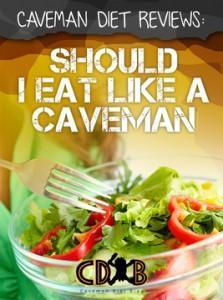
 Caveman Diet Reviews:
Caveman Diet Reviews:
Should I Eat Like A Caveman?
If you have ever asked yourself, “Should I eat like a caveman?”, read this article and then go back and ask yourself the same question again.
When Dr. Loren Cordain, PhD. published his book The Paleo Diet, he made the premise of his theory quite transparent. His theory is that our Stone Age ancestors did not suffer from any of the modern debilitating diseases that we suffer today. The caveman suffered not from hypertension, diabetes, obesity, modern forms of cancer, nor opportunistic diseases caused by a low immune system.
Moreover, the Stone Age man had no vaccinations against disease, and no medical care. His or her protection against the elements was dependent entirely on their bodies’ energy levels and on their wits to come up with solutions for food, clothing and shelter, as there was no control, as we lack it today, over whatever nature provides. They were hunters and gatherers.
What was the catalyst that allowed this race of people to survive, thrive, and progress?
What’s in your body?
As a problem solver, the Stone Age man obtained nourishment from the foods that were naturally and immediately found in the environment. Protein came mainly from animals and insects.
Fibrous foods, minerals, and some vitamins came from naturally-found plant forms. This was the basis of their subsistence. Hence, by eating what they were genetically meant to eat, the Stone Age people made optimal use of their bodies, as they were well-nourished, strong, and full of energy.
Should we not be doing the same?
The Paleo lifestyle was originally known as “The Caveman Diet”, or “The Stone Age Diet”. Based on Dr. Cordain’s premise on how the Stone Age man ate, this way of life is based on using foods that are natural; foods that we are biologically meant to consume.
What we do, instead
Many of us, on a daily basis, eat pre-packaged, preservative-filled items that do not add up to the sum of macronutrients that all Paleo practitioners aim to reach. Moreover, we eat too much of things that nourish us too little.
Our modern, artificial foods pack up lots of calories, sugar, salt, hydrogenated fats, and cancer-causing manufactured flavors and substances to make food look real. Good vitamins, minerals, proteins, fats, and even energy-building calories are lacking, making us run on empty on a daily basis.
On a Paleo lifestyle, you can eat:
- meats
- eggs
- specific nuts and some seeds
- olive and coconut oil
- fruits
- vegetables
- wine and non-grain based alcohols
- raw honey
- sea-salt
- herbs and seasonings
- coconut water, milk
Foods to avoid include:
- dairy
- refined sugar
- table salt
- roots such as yams and potatoes
- breads
The Caveman Diet is NOT:
- a low carb program such as Atkins
- a calorie-counting program
- a pre-packaged food program
- a short-term weight-loss crash diet
Paleo is
- a way of life
- based on food swaps and substitution
- about being creative and proactive with food.
Who should not enter a Paleo lifestyle?
If you are vegetarian, or vegan, chances are that your main source protein comes from legumes and grains. These are the foods not included in the Paleo diet. There are some Paleo Vegetarians out there and Pegans (Paleo + Vegans), but it’s a little more challenging (not impossible) to get all of the nutrients that you need.
Also, Paleo is about the hunter and gathering aspect of the Stone Age man’s diet. It is a lifestyle based on recreating a past practice. Our ancestors probably would have not made it as vegetarians; at least not for an extended period of time, with the need for fats to keep their bodies protected from the elements, as well as for their need of other important nutrients found in meat.
Who can benefit from Paleo?
Bad eaters. People who eat junk food and feel as if they are addicted to preservative-filled foods, will find a great benefit in re-discovering their “human” eating side.
Paleo substitutions will show these eaters ways to enjoy salty, sweet, savory and filling meals that do not have to be pre-packaged, frozen, or canned. They will re-discover food, and learn to enjoy it the right way. Moreover, they will find amazing benefits coming from a low-preservative, low-sugar, and low-salt diet.
So, did you ask yourself again “ Should I eat like a caveman?”
- Can you consider swapping junk foods with natural, similar-tasking alternatives?
- Can you budget your junk food money and spend it on good food?
- Are you going to take the time to prepare Paleo meals that you can take with you anywhere?
If you answered “YES” to any of these questions, you are well-on-your-way to completing your paleo diet review and becoming a Paleo convert!

